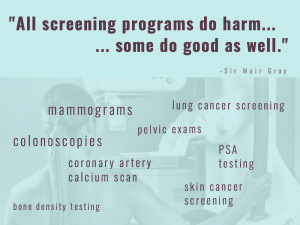The Brain Tumor Foundation’s Road to Early Detection is in Brooklyn, New York, this week, offering free brain tumor screening in its mobile MRI unit to anyone who signs up.
The flyer for free MRI brain scans in Brooklyn
The visit appears to be the foundation’s second stop on its current “sponsor-a-city” campaign. Earlier this year, the campaign visited Saratoga Springs, New York. Some local journalists enthusiastically covered the screening events (examples here, here and here), but they didn’t stop to explore a key question: Is public cancer screening always a good thing?
It’s easy to see why reporters were enticed by this story. The Foundation’s Road to Early Detection PR materials present two seemingly startling statistics: “more than 800,000 people in the U.S. will be diagnosed with a brain or central nervous system tumor,” and “over a million people” are living with an undetected brain tumor.
That sounds like a lot. Yet, it is not clear where these statistics come from. (It’s also not clear what time period the first statistic covers.) According to the National Brain Tumor Society, about 700,000 people in the U.S. are living with a brain tumor (80 percent of which are benign) and an estimated 79,000 new diagnoses (55,150 which will be benign) will occur in 2018.
Benefits vs. the costs

Brain tumor screening, like all screening, has downsides.
Benign tumors can grow large and cause symptoms. Malignant brain tumors are cancers. The American Cancer Society estimated that this year, 23,880 adults and children would be diagnosed with a brain or spinal cord tumor and 16,830 adults and children would die from these types of tumors. To put this in perspective: There is a less than 1 percent chance that a person will develop a malignant tumor of the brain or spinal cord in his or her lifetime.
The Road to Early Detection campaign touts the idea that the free brain scans will reduce these deaths. And that’s possible–but the campaign will almost undoubtedly also cause harm. As we explain in our primer on cancer screening cancer screening is imprecise, and the benefits don’t always outweigh the risks. And as we’ve noted before, these costs may be even higher for public screening campaigns in which tests are offered even though there is absolutely no evidence they decrease a person’s risk of dying from the disease they are being screened for.
‘A completely different ball game’
The Foundation’s news release explains that the campaign is part of a research study, which perhaps contributed to the idea that the scans would be beneficial. An oncologist quoted in some of the Saratoga Springs coverage explains that the scans are a modified form of MRI that takes only 10 minutes and are “so sensitive they can pick up abnormalities, which may then require a full MRI.” He also notes that “in addition to brain tumors, a scan of this kind can pick up Alzheimer’s disease, multiple sclerosis and aneurysms.”
It sounds like a twofer—or more! But there are things you can pick up that you can’t do anything about—except possibly worry, some experts point out.
Saurabh Jha, MD
“The idea of catching cancer early before it becomes inoperable and incurable is a good one,” says Saurabh Jha, MD, an associate professor of radiology at the Hospital of the University of Pennsylvania and a HealthNewsReview.org contributor. “The problem is that when you catch something it’s not necessarily cancer that you are catching, it’s a range of things that look like cancer and that could be cancer.”
If there’s a large tumor that shows up on a scan, says Jha, there’s no question what it is. The problem is the small things, which may or may not be cancer, and leave you with the question: What do I do now?
“Brain surgery is not an idle undertaking,” says Jha. “You can easily biopsy the prostate. But a biopsy of the brain is a completely different ball game. And that biopsy itself can cause harms.”
Is it a representative sample?
The Brain Tumor Foundation and its research partners say they’re collecting data from the screening program to learn about brain tumors. This doesn’t mean it will shed any light on benefits or drawbacks of screening. For one, the people who go for brain scans might not be representative of the general population. They may be more likely to have symptoms of brain cancer, get regular headaches, have high levels of anxiety about their health, or lack insurance. Also, since this isn’t a randomized, controlled trial there is no way to see if brain scans used as a general screening tool actually reduce brain cancer deaths.
This study also is not tracking the financial, emotional or physical harms of the test results.
And, what about follow up?
The scan is free. But if something shows up, the follow-up tests can not only be expensive, but potentially cause emotional and physical harm.
Right now, brain tumors are typically discovered after a person develops symptoms that lead them to see a doctor.
With a scan, “you can find small tumors,” says Jha, “but if the patient is asymptomatic, taking it out in anticipation of symptoms has the potential to create other problems. Finding things has the potential to backfire spectacularly.”
We’ve been here before
Our coda is actually a refrain: In 2009, we first reported about uncritical news coverage of the Foundation’s screening campaign. We reported about it again in 2011. That time we noted the screening was being paid for by the New York City Council, despite the lack of evidence showing it provided any benefit to city residents. Here we are again, seven years later, echoing the same concerns. It’s past time for the Foundation and journalists who cover this campaign to report on how many scans have been done, how many tumors have been found, and how many people have been harmed. The public has a right to know the cost of these free scans.
